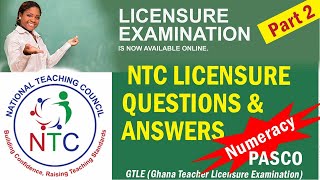
Here we have compiled possible sets of NTC Pedagogy exam questions for the upcoming licensing before all trainees are trained.
What to know National Teaching Council
As part of the mandates of the National Education Council (NTC), the Council is responsible for organizing licensing exams for the forty-six (46) colleges of education under its auspices to produce the best teachers of the 21st century after passing numerous exams. in their schools.
NTC is responsible for all activities and efforts necessary to successfully complete an exam or test and ultimately prepare teachers for the job market/classroom.
According to the NTC, teachers will write a computerized test as part of the new reform from 2023. With the aim of measuring the quality of newly trained teachers who are about to start their careers.
Top Major NTC exams structure
The new reform has led to the organization of the tests in three (3) major ways:
- General Paper
- Related Pedagogy
- Teaching Subject-based Paper
The general paper assesses teachers’ proficiency in literacy (English), numeracy (mathematics), and basic skills, which are critical components of educating students. Teachers are required to pass this document to demonstrate competency in these foundational areas.
The pedagogy document covers the arts and sciences as well as the major career of a teacher and teaching professional. Its main focus is on the most appropriate teaching methods for the particular type of learner in the classroom. It also covers feedback, evaluations, and different teaching methods that help nurture future leaders.
The subject-based essay contains a variety of questions that test a teacher’s competence in the subjects in which he or she majored during college. The subject-based document is a benchmark for measuring the knowledge and skills required of new teachers, and will be published and adopted by the government.
List Of NTC Pedagogy Past Questions & Answers
When teaching students new concepts, the teacher is keen to take a direct approach
Instruction with guided and independent practice activities. Although the students seem to be
They have a good understanding of new concepts every time, the teacher often discovers it
Unable to remember what they learned. Which of the following strategies is
They are likely to be most effective in enhancing students’ ability to absorb what has been newly learned
concepts?
a. Have students use a section of their folders to keep an ongoing list of items
Newly learned concepts
B. Identify a variety of real contexts in which students can apply newly
learned concepts
C– Clarifying the target concept at the beginning and end of each lesson
D– Using various incentive systems to reward students for mastering new concepts
6. A senior primary school teacher frequently assigns student projects. for the first time
The teacher discusses the goals of the project with the students. next to the students
Develop the project plan, identifying the activities they will implement and the products they will perform.
They will develop to achieve target goals, and then revise their plan with
the teacher. This approach is likely to be most effective in achieving either
Next goals?
a. Support students in taking responsibility for their own learning
B. Communicate with students high expectations for their performance and
to learn
c. Increase the relevance of academic content to students’ lives and experiences
d– Ensuring that instructions respond to students’ individual needs and interests
According to Jean Piaget, children develop abstract logic and reasoning skill during
(A) Sensorimotor stage
(B) Preoperational stage
(C) Concrete operational stage
(D) Formal operational stage
Children are usually egocentric during _ and _ stages.
(A) Sensorimotor, Preoperational
(B) Preoperational, Concrete operational
(C) Concrete operational, Formal operational
(D) Formal operational, Sensorimotor
According to Jean Piaget, children are no longer egocentric when entering
(A) Sensorimotor stage
(B) Preoperational stage
(C) Concrete operational stage
(D) Formal operational stage
According to Piaget’s theory of cognitive development, the Concrete operational stage starts at the age
(A) 3
(B) 7
(C) 11
(D) 15
According to Piaget’s theory of cognitive development, the Formal operational stage starts at the age
(A) 3
(B) 7
(C) 11
(D) 15
ANSWERS:
- (D) Formal operational stage
- (A) Sensorimotor, Preoperational
- (C) Concrete operational stage
- (B) 7
- (C) 11
The most recent response is most likely to
(A) forget
(B) compromised
(C) reoccur
(D) not occur again
Rousseau advocated an educational method that consisted of removing the child from
(A) school
(B) burden
(C) memory
(D) society
Who advocated removing children from their mothers’ care and raising them as wards of the state?
(A) Socrates
(B) Plato
(C) Aristotle
(D) John Locke
The famous book “The Republic” was written by
(A) Socrates
(B) Plato
(C) Aristotle
(D) John Locke
“All who have meditated on the art of governing mankind have been convinced that the fate of empires depends on the education of youth.” This is the saying of
(A) Aristotle
(B) Socrates
(C) Plato
(D) John Locke
ANSWERS: PEDAGOGY QUIZ
- (C) reoccur
- (D) society
- (B) Plato
- (B) Plato
- (A) Aristotle
The Waldorf education approach emphasizes a balanced development of
(A) head and heart
(B) head and hands
(C) heart and hands
(D) head, heart, and hands
Plato believed that talent and intelligence are
(A) distributed genetically
(B) not distributed genetically
(C) distributed gender-wise
(D) not distributed gender-wise
A priori knowledge is a knowledge that is known independently of
(A) analysis
(B) information
(C) experience
(D) evidence
A posteriori knowledge is a knowledge that is known by
(A) analysis
(B) information
(C) experience
(D) evidence
According to John Locke, a child’s mind does not contain any
(A) innate ideas
(B) memory
(C) observation
(D) imagination
ANSWERS: PEDAGOGY QUIZZES
- (D) head, heart, and hands
- (B) not distributed genetically
- (C) experience
- (C) experience
- (A) innate ideas
The philosopher who for the first time mentioned the importance of play (or sports) in education was
(A) Socrates
(B) Plato
(C) Aristotle
(D) John Locke
Beautiful